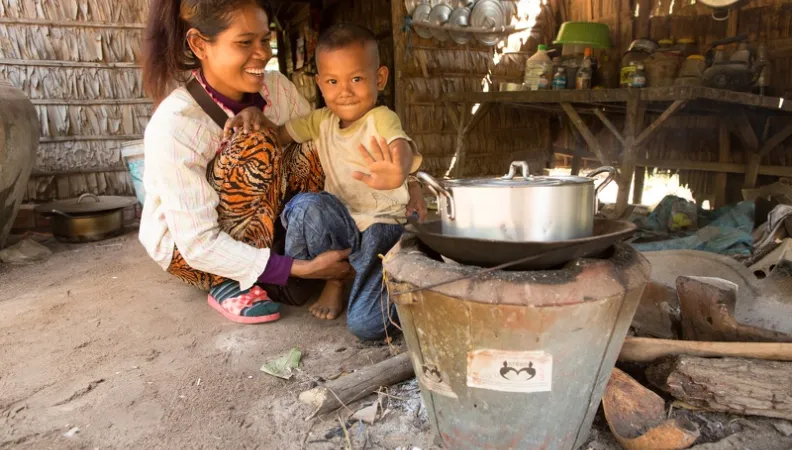Share the page
International Program on Clean Cooking Stoves (StovePlus)
Project


-
Project start date
-
Status
Completed
-
Estimated date of project termination
-
-
Project financing date
-
-
Financing duration
-
4 years
-
Type of program
-
FFEM
-
Global financing amount
-
€ 7 479 936
-
FFEM financing amount
-
€ 2 000 000
-
Project lead member institution(s)
-
Ministry for Europe and Foreign Affairs
-
Country and region
-
Asia - Multi-country, Africa - Multi-country
-
Location
-
Cambodge
-
Type of financing
-
Partners
-
World Bank
-
Beneficiaries
-
GERES
-
Type of beneficiary
-
NGO, Foundation
Ensure widespread and sustainable access to certified, efficient, and clean cookstoves for populations in selected countries of Southeast Asia and West Africa, through innovation, technology, and knowledge transfer.
Context
“StovePlus” is a project developed by the Renewable Energy, Environment and Solidarity Group (Geres), a non-profit, non-governmental organization founded in 1976.
The inefficient use of wood as fuel has both local and global environmental impacts. Rapid urbanization in many countries of Sub-Saharan Africa and Southeast Asia, combined with inefficient charcoal production and low-efficiency cooking devices, threatens forest cover in nearby harvesting areas. In addition, the unsustainable collection of biomass and the soot emitted from traditional cookstoves contribute significantly to climate change.
Given the challenges and specific context of biomass use as a domestic energy source in West Africa and Southeast Asia, improved cookstoves (ICS) — which consume less fuel and emit fewer pollutants — offer a sustainable solution. It is estimated that more than 50 million new improved wood-burning cookstoves could be marketed annually in the selected countries.
Description
The project is structured around three key components:
- Establishing a partnership within the “StovePlus” initiative:
The objective is to ensure a long-term vision and coordinated support for the promotion of clean and efficient biomass cookstoves, as well as alternative biomass fuels. The program initially focuses on Southeast Asia and West Africa, with potential expansion into Central Africa and Central Asia. - Development of production and marketing of improved cookstoves:
The goal is to develop and/or support the large-scale production and commercialization of certified, efficient, and clean biomass cookstoves in Least Developed Countries (LDCs) in West Africa and Southeast Asia. This will be achieved by establishing service centers that offer portfolios of services, best practices, and information to support project developers and decision-makers. - Removing institutional and financial barriers:
The program aims to help overcome institutional and financial barriers to the large-scale dissemination of certified, efficient, and clean biomass cookstoves and alternative biomass fuels. These efforts will reinforce the operations of the service centers in the selected countries.
Outcomes
- By reducing pressure on forests, the project helps limit greenhouse gas emissions and thus contributes to the fight against climate change. It also improves air quality, with positive effects on health and the environment, thanks to the more efficient combustion of biomass energy.
- The living conditions of local populations are improved through lower energy costs for users of improved cookstoves. Moreover, local technological production strengthens the private sector and creates new employment opportunities.


